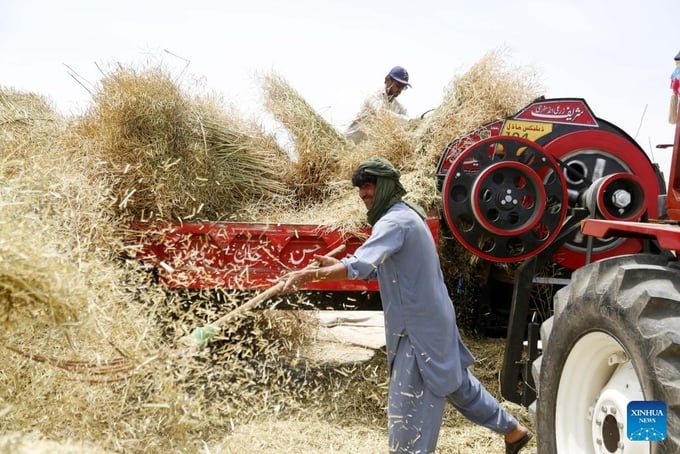November 25, 2025 | 10:27 GMT +7
November 25, 2025 | 10:27 GMT +7
Hotline: 0913.378.918
November 25, 2025 | 10:27 GMT +7
Hotline: 0913.378.918

Farmers harvest canola at a field in Pakistan's eastern Bhakkar district on April 17, 2024. In Pakistan's eastern Bhakkar district, farmers were left in awe as they witnessed the newly imported oilseed harvesters from China efficiently and briskly carrying out their tasks. Photo: Xinhua
"In Pakistan, we lose up to 40 percent of our crop due to our reliance on a single type of harvester used for harvesting all crops including wheat, oilseeds, and others, so seeing such a sophisticated machine specifically designed for oilseed harvesting is truly fascinating," Muhammad Masood, a local farmer told Xinhua.
While Pakistan is an agricultural-centric economy, it relies on imports for approximately 89 percent of its edible oil needs and spends 3.6 billion U.S. dollars annually to fulfill the demand of around 5 million tons.
Due to the high cost of imported edible oil, many villagers had to resort to cheaper but unhealthy alternatives such as mustard oil because of the unavailability of good quality oil seeds in the local market, he said.
However, with the introduction of the Chinese canola variety into the market under Pakistan-China cooperation, the local farmers finally got a choice, the farmer added.
Launched in 2013, the China-Pakistan Economic Corridor (CPEC) is a corridor linking the Gwadar Port in southwest Pakistan's Balochistan province with Kashgar in northwest China's Xinjiang Uygur Autonomous Region, which highlights energy, transport, and industrial cooperation in the first phase, while in the new phase expands to fields of agriculture and livelihood, among others.
In line with the CPEC's cooperation in agriculture, Chinese company Wuhan Qingfa Hesheng Seed Co. Ltd. and Pakistani company Evyol Group signed a memorandum of understanding in 2022 to help Pakistan become self-sufficient in edible oil through ample cultivation and efficient harvest of healthy canola oilseeds.
Talking to Xinhua, Ghazanfar Ali, head of marketing in Evyol Group, said that in the first phase, the Chinese company provided high-quality hybrid seed for cultivation, which not only increased per acre yield as compared to local oilseeds but also provided a healthy alternative to locals.
In the second phase, the company is working on transferring technology to Pakistan, under which the harvesters have been imported from China, paving the way for smart agriculture practices in the country, said Ali.
Subsequent plans for the third phase involve importing oil-extracting machines, which will enable local farmers to extract the oil themselves for domestic consumption and commercial use, he added.
Talking about the new machines, Zhou Xusheng, director of the international business department of Wuhan Qingfa Hesheng Seed company, told Xinhua that they have developed two kinds of harvesting equipment that align with local cultivation and use habits.
One of the equipment enables one-time harvesting, slashing harvest loss to eight to ten percent while the other offers a two-stage approach, which involves cutting the crop close to maturity and picking it up two to three days later, reducing loss to less than five percent, he added.
The technological advancement can boost yields by 20 to 30 percent, thereby enhancing farmers' incomes and accelerating widespread adoption, compatible with existing harvesters in Pakistan, Zhou said.
The harvesters will be further customized according to the requirements of locals, after feedback from local farmers and agriculture experts, following which the bulk import of the equipment will be made, Ali told Xinhua.
He underscored CPEC's role in elevating socio-economic standards by empowering farmers to embrace advanced technology."Through technology transfer, CPEC empowers local farmers to not only reduce labor and costs but also increase their earnings, enabling them to lead more prosperous lives, besides giving benefit to society as a whole," he said.
Talking about the significance of the technology transfer, Akmal Siddiq, technical advisor at the country's Ministry of National Food Security and Research said that during the oilseed harvest season, there is a shortage of labor in the agriculture sector as almost all winter crops are being harvested during the time.
The available labor is also not so skilled and when they harvest the crop by primitive measure, the overall productivity of the sector gets affected, he added.
"The adoption of Chinese agricultural technology represents a critical opportunity to modernize and transform the oilseed harvesting landscape in the country. Through effective technology transfer and adoption, the agricultural sector can overcome longstanding challenges, boost productivity, and contribute to the nation's food security and economic development," the official told Xinhua.
(Xinhua)

(VAN) Brazil's COP30 presidency pushed through a compromise climate deal on Saturday that would boost finance for poor nations coping with global warming but that omitted any mention of the fossil fuels driving it.

(VAN) Poultry farmers in the UK have been warned that they could face one of the worst winters yet for bird flu.

(VAN) Prices of main-crop paddy have risen sharply, with jasmine rice hitting 16,100 baht per tonne — the highest level in years.

(VAN) In Brazil, FAO unveiled a series of reports and initiatives showing how sustainable agrifood systems are a solution to the climate crisis.

(VAN) With names like neodymium and dysprosium, rare-earth elements sound exotic — and their perceived scarcity has only added to the mystique.

(VAN) In a new study published in Trends in Biotechnology, researchers used a gene-editing technology called CRISPR to increase a fungus's production efficiency and cut its production-related environmental impact by as much as 61%- all without adding any foreign DNA.

(VAN) A top official in Beijing’s Cop delegation says China is committed to clean energy – but US’s absence is a problem.